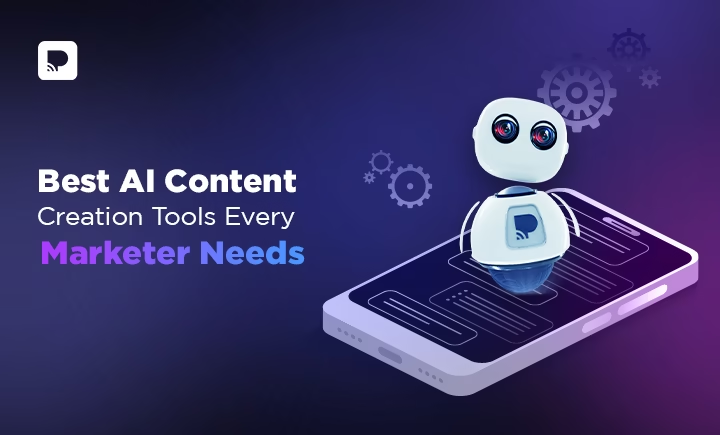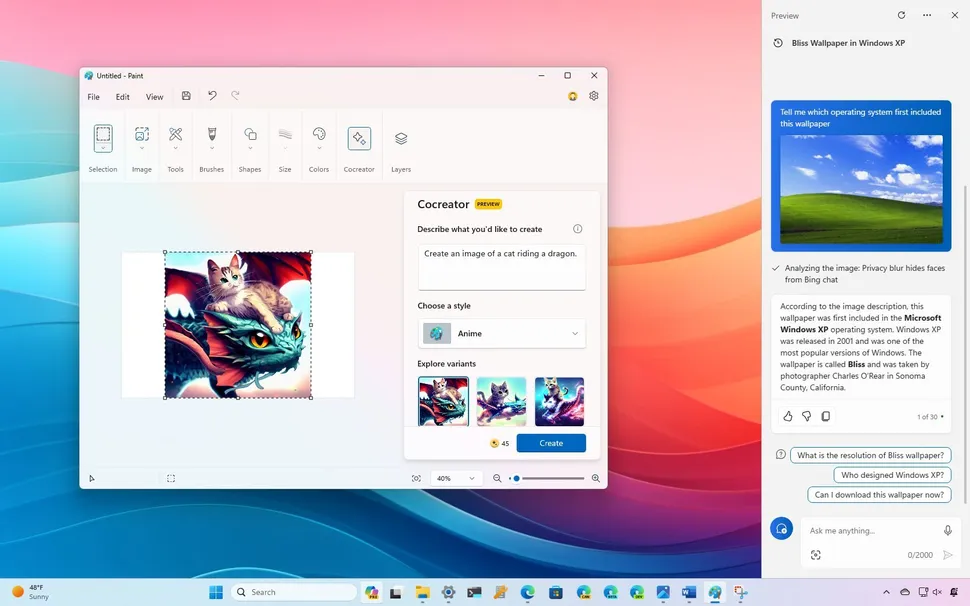“`html
The Dawn of Intelligent Content Generation: AI’s Transformative Role
The digital landscape is experiencing an unprecedented surge in content demand. From marketing campaigns and social media updates to detailed articles and engaging video scripts, businesses and individuals alike are constantly striving to create more, and do it better. However, this escalating need presents significant challenges for content creators, demanding consistent output, creative flair, and efficient execution. It’s within this dynamic environment that Artificial Intelligence (AI) has emerged as a powerful force, fundamentally reshaping how content is conceived, produced, and distributed.
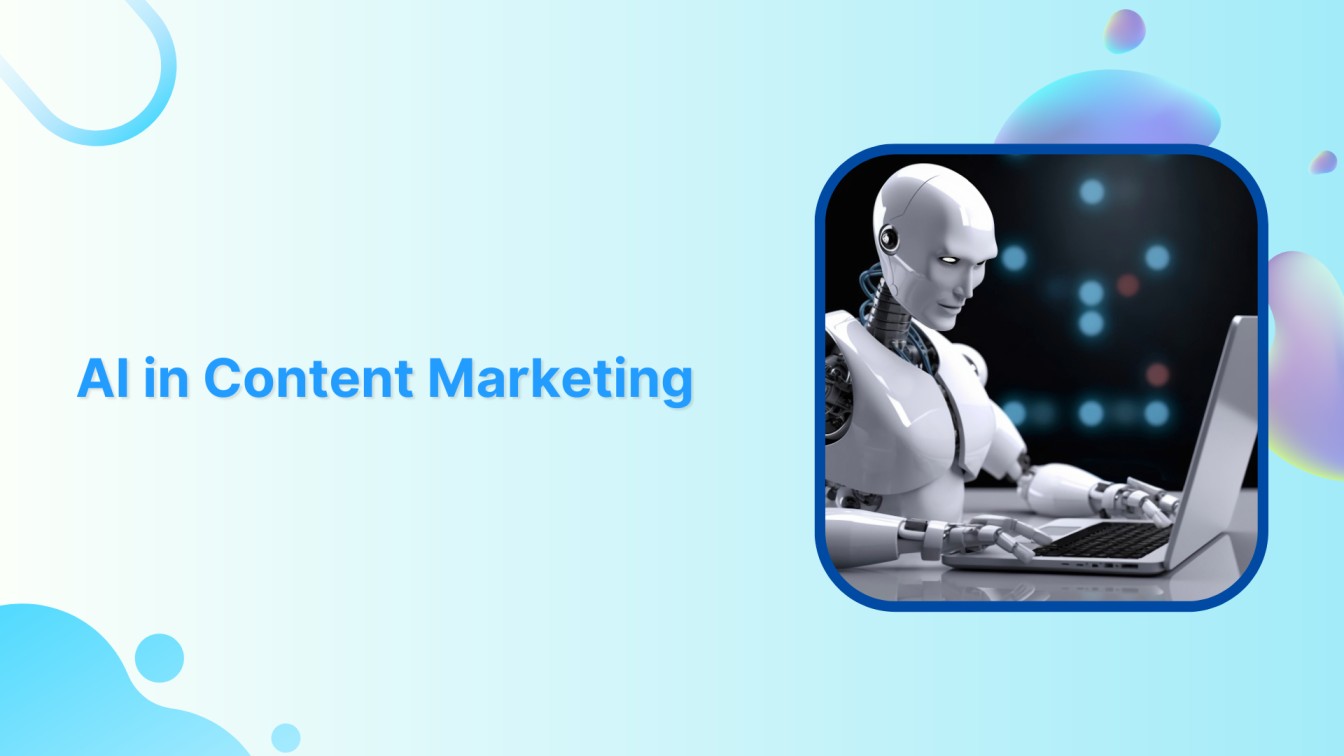
The primary keyword, “AI in content creation”, is no longer a futuristic concept but a present-day reality, marking its growing importance as a transformative force across industries. AI is revolutionizing content marketing AI strategies, offering new avenues for enhanced productivity and unlocking creative potential that was previously unimaginable. Modern businesses, in particular, grapple with an ever-increasing demand and complexity in their content needs. Meeting these challenges efficiently has driven the explosive adoption of AI solutions, with many organizations now integrating AI as a foundational element of their digital marketing strategies. In fact, as of 2025, over 80% of marketers report active use of AI in their strategies (Source: typeface.ai). AI’s impact is particularly pronounced in the realm of “content marketing AI”, where efficiency, rapid ideation, and data-driven personalization are highly prized (Source: typeface.ai).

This post aims to explore the multifaceted impact of AI on content creation, offering valuable insights for a wide range of professionals, from seasoned marketers to budding bloggers. We will delve into what AI content creation entails, how it functions, and the myriad benefits it offers. Furthermore, we’ll examine specific use cases for bloggers and marketers, navigate the diverse AI toolkit available, and emphasize the indispensable human touch that remains crucial in this evolving landscape. Finally, we will peer into the future, anticipating the ongoing evolution of AI in content creation and its potential to democratize high-quality content production.
Deconstructing AI Content Creation: What It Is and How It Works
At its core, “AI content creation” refers to the utilization of artificial intelligence technologies to generate, optimize, or distribute various forms of content. This encompasses written text, visual elements, and even audio content. The underlying technologies powering these capabilities are primarily Natural Language Processing (NLP) and machine learning. AI models are trained on vast datasets, enabling them to understand context, mimic various writing styles and tones, and ultimately produce human-like language or imagery. Crucially, these tools are designed to be accessible, allowing users to leverage their power without requiring deep technical expertise (Source: typeface.ai).
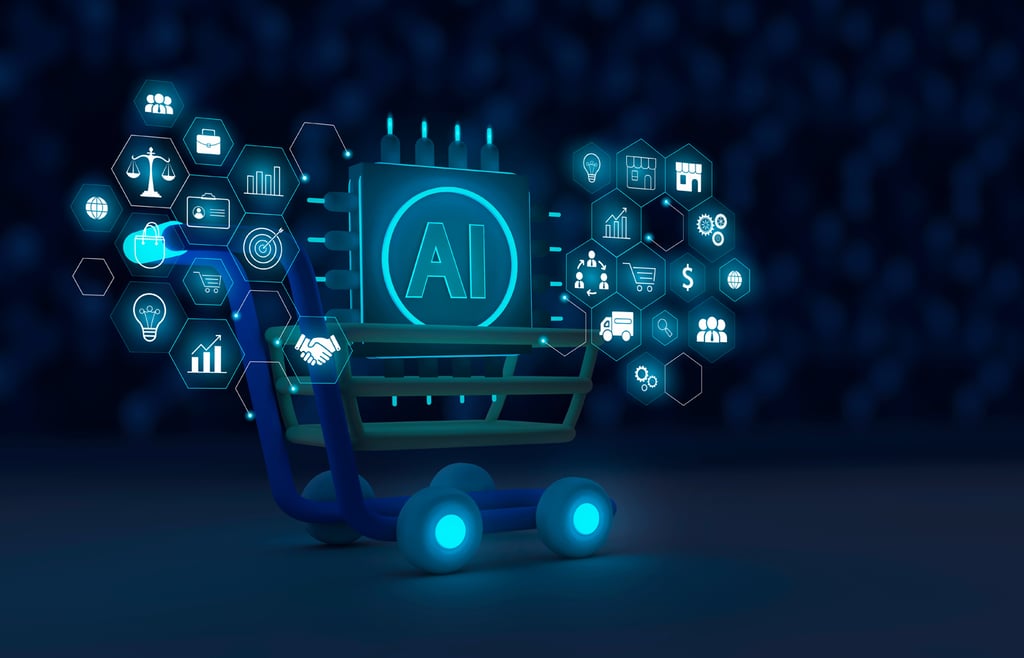
It’s important to differentiate between AI-generated content and content created solely by humans. While AI-generated content excels in speed and scalability, enabling the rapid production of large volumes of material, human-written content often possesses a unique nuance, originality, and strategic intent that AI is still developing. Therefore, the most effective approach often involves a synergy between AI and human input, where AI handles the heavy lifting of drafting and optimization, while humans provide the critical oversight, strategic direction, and creative refinement (Source: typeface.ai).
The AI Revolution in Content Marketing AI
AI tools are increasingly integrated into every stage of the content marketing lifecycle, streamlining workflows and boosting effectiveness:
- Content Ideation and Research: AI algorithms can analyze current trends, competitor strategies, and audience search intent to suggest relevant and engaging topics. This capability is highly valued, with 68% of marketers leveraging AI for ideation (Source: siegemedia.com).
- Content Generation: AI writing assistants can draft articles, blog posts, social media copy, email newsletters, and more, significantly reducing the time spent on initial drafting. A substantial 47% of marketers utilize AI for direct content generation (Source: siegemedia.com).
- Content Optimization: AI automates crucial tasks such as SEO analysis, readability checks, grammar correction, and content personalization, ensuring that content resonates with the target audience and performs well in search engines. Over half of marketers employ AI for content optimization (Source: digitalmarketinginstitute.com).
- Content Distribution: AI can identify the optimal times and channels to publish content, maximizing reach and engagement by responding to real-time audience behavior and interaction data (Source: typeface.ai).
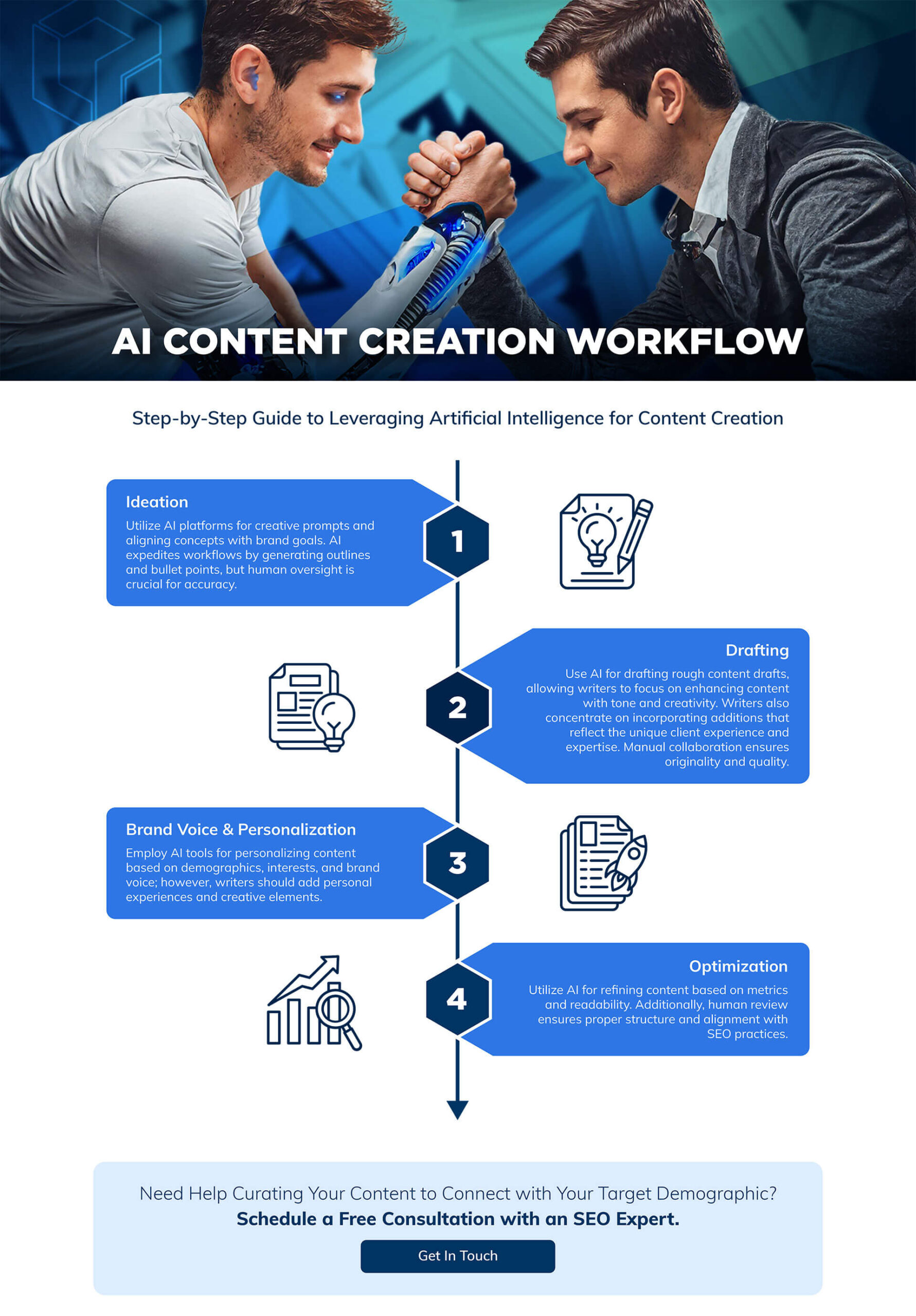
Unlocking Potential: The Advantages of AI Writing for Businesses and Individuals
The adoption of AI in writing offers a compelling suite of benefits:
- Efficiency and Speed: AI tools drastically cut down the time spent on ideation and drafting. A remarkable 86% of marketers report that AI saves them over an hour daily on creative development tasks (Source: typeface.ai).
- Scalability: AI empowers teams to produce content at a greater volume and with enhanced consistency, which is critical for brands with extensive content needs. Notably, 45% of B2B marketers are actively seeking scalable content solutions (Source: typeface.ai).
- Cost-Effectiveness: By automating drafts and repetitive tasks, AI reduces the reliance on extensive manual effort, thereby trimming operational costs and freeing up human writers to focus on higher-value strategic and creative work (Source: typeface.ai).
- Overcoming Writer’s Block: AI can serve as an invaluable creative prompt generator and brainstorming partner, helping solo creators and teams break through ideation obstacles and maintain momentum (Source: siegemedia.com).
- Data-Driven Insights: AI’s ability to analyze performance metrics, audience behavior, and engagement patterns provides actionable insights that can be used to optimize future content and enhance campaign effectiveness (Source: digitalmarketinginstitute.com).
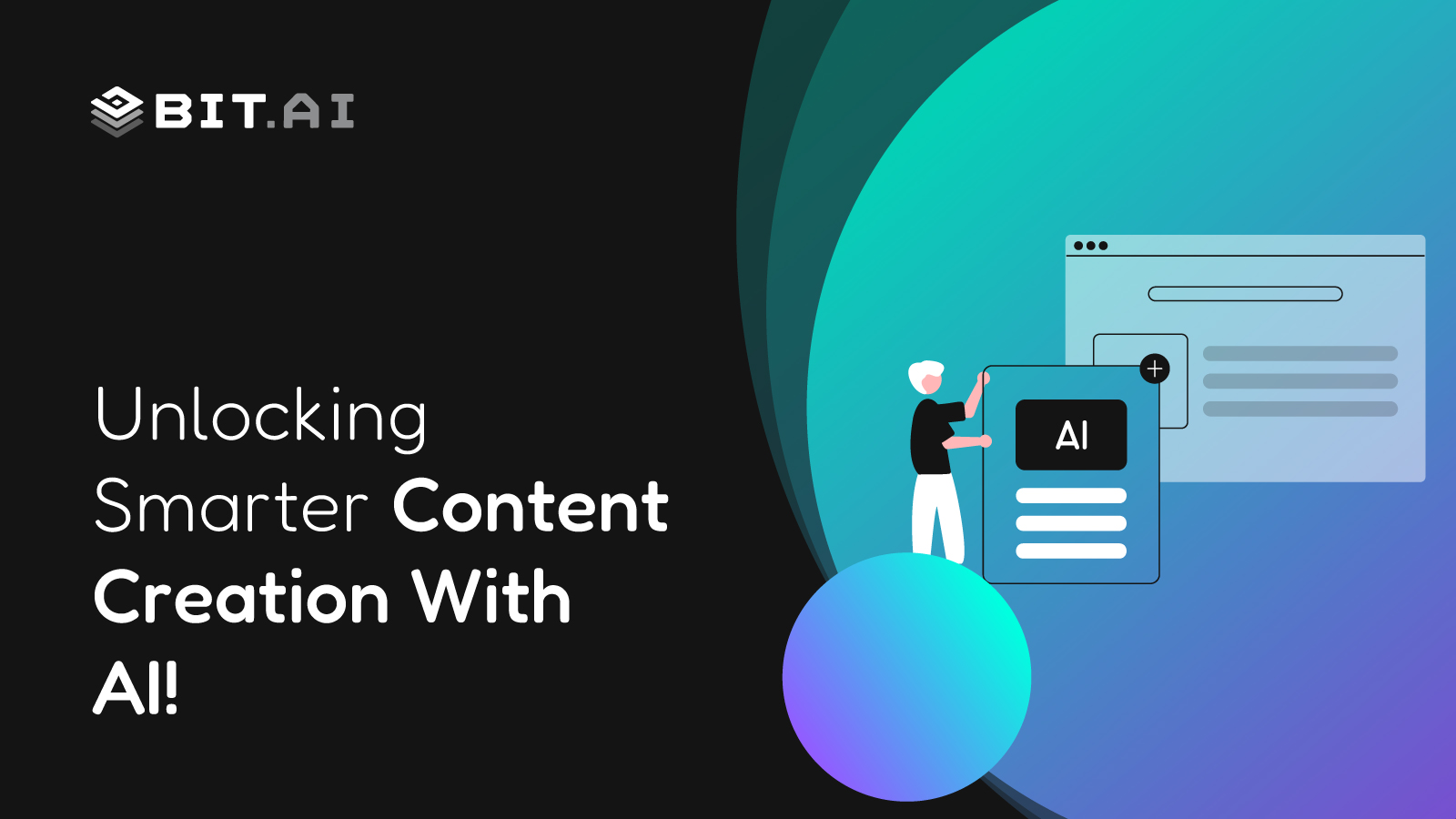
AI for Bloggers: Your Creative Co-Pilot
For bloggers, AI can be a game-changer, acting as a sophisticated creative co-pilot:
- Generating comprehensive outlines, compelling titles, meta descriptions, and even initial drafts, often achieving 80-90% completeness for subsequent human refinement (Source: typeface.ai).
- Crafting engaging social media captions and promotional lines that are precisely tailored to the blog content.
- Suggesting keyword-rich headlines designed to boost SEO performance and attract more organic traffic.
- Streamlining repetitive writing tasks, thereby freeing up bloggers to concentrate on injecting their unique voice, adding depth, and developing more intricate narratives.
- It’s crucial to emphasize the need for regular editing, as 86% of AI-generated content undergoes further refinement by its human creators to ensure alignment with personal or brand style (Source: typeface.ai).

AI for Marketers: Elevating Campaign Strategy and Execution
Marketers can leverage AI to significantly elevate their campaign strategy and execution:
- Automating the creation of ad copy, landing page content, and product descriptions across multiple platforms, ensuring consistency and speed.
- Enabling dynamic personalization of email campaigns and more precise audience segmentation for targeted messaging.
- Providing real-time campaign analytics and data-driven recommendations for content improvements and performance forecasting (Source: typeface.ai; Source: adobe.com; Source: digitalmarketinginstitute.com).
- Developing effective content optimization and multichannel distribution strategies through the power of predictive analytics.

Navigating the AI Toolkit: Types of Content Creation Platforms
The AI content creation landscape is diverse, with tools categorized by their core functionalities:
- Writing and Editing Assistants: These tools focus on generating or polishing textual content, from initial drafts to final edits.
- Content Summarization Tools: Ideal for condensing lengthy research, articles, or user-generated content into digestible summaries.
- Image and Video Generators: AI that creates visuals or video scripts based on prompts, opening new avenues for multimedia content.
- SEO Analyzers and Optimizers: Tools that help ensure content is discoverable and performs well in search engine results.
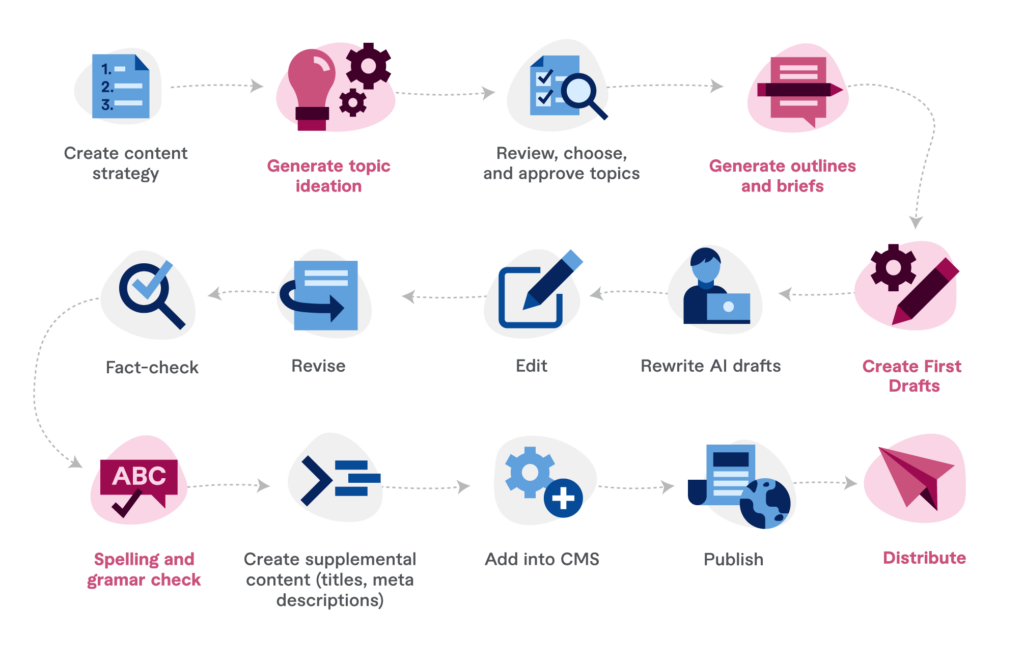
While many specific product names exist, the focus here is on understanding the type of tool and its role within a content creation workflow.
The Indispensable Human Touch: AI as Collaborator, Not Replacement
It is vital to underscore that AI is a collaborator, not a replacement for human creativity and judgment. While 70% of marketers acknowledge that AI can outperform humans in speed and volume, human creativity, critical thinking, and nuanced editing remain irreplaceable (Source: typeface.ai).

Tasks requiring a deep understanding of brand voice, emotional resonance, fact-checking, and strategic intent are best guided by humans. Reinforcing this, a significant 86% of AI users actively spend time editing AI-generated content to ensure it meets their specific needs (Source: typeface.ai).
Ultimately, the most successful content creation strategies emerge from human-AI collaboration, seamlessly combining AI’s ability to scale and enhance efficiency with the irreplaceable nuances and strategic oversight that humans provide.
Peering into the Future: The Evolving Landscape of AI in Content Creation
The trajectory of AI in content creation points towards increasingly sophisticated capabilities. We can anticipate greater integration of real-time analytics, enabling hyper-personalization at scale, and the development of more advanced creative generation capabilities. Projections suggest these advancements will continue through to 2030 (Source: explodingtopics.com; Source: mckinsey.com).

As AI continues to evolve, content creation is expected to become progressively cheaper, more adaptive, and more data-driven. This democratization of powerful tools will empower not only large enterprises but also independent creators and small businesses alike (Source: siegemedia.com; Source: typeface.ai).
Furthermore, ongoing advancements in generative models and the increasing accessibility of AI technologies will undoubtedly continue to democratize high-quality content production, leveling the playing field for creators across the globe.
Embracing the Future of Content
In summary, AI in content creation delivers tangible benefits across speed, scale, efficiency, and optimization. For both AI for bloggers and AI for marketers, these tools unlock new levels of productivity, foster enhanced creativity, and enable more data-driven strategies. Embracing AI writing and the broader field of content marketing AI is essential for achieving long-term digital content success, always remembering the crucial role of human oversight in this dynamic partnership.
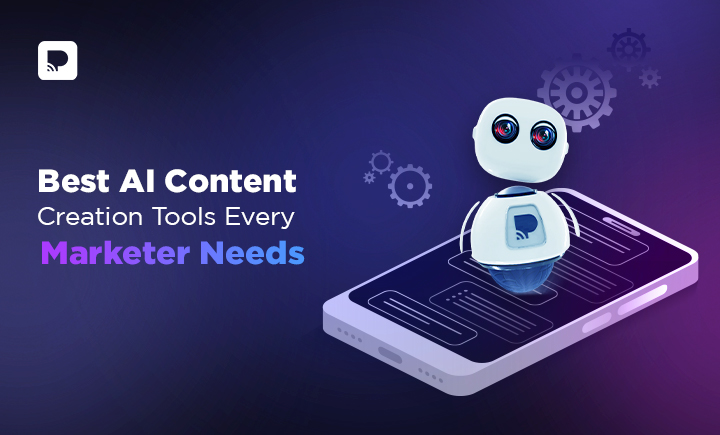
Introduction: The Dawn of Intelligent Content Generation (Continued)
The ever-increasing demand for digital content presents a continuous challenge for creators. Meeting this demand consistently and efficiently requires innovative solutions. This is where the transformative power of AI in content creation truly shines, offering new avenues for productivity and creativity. Modern businesses face unprecedented content demands and complexity, making the adoption of AI solutions not just advantageous, but increasingly essential for efficient operations. The impact of AI is particularly strong in content marketing AI, where efficiency, rapid ideation, and personalization are paramount (Source: typeface.ai).
Deconstructing AI Content Creation: What It Is and How It Works (Continued)
As previously discussed, AI content creation relies on technologies like Natural Language Processing (NLP) and machine learning. These AI systems are trained on vast datasets, allowing them to understand context, replicate various tones, and generate human-like language or images. The accessibility of these tools means that users can harness their capabilities without needing to be AI experts (Source: typeface.ai). While AI-generated content offers speed and scalability, human oversight remains critical for nuance, originality, and strategic intent, making human-AI collaboration the most effective approach (Source: typeface.ai).
The AI Revolution in Content Marketing AI (Continued)
AI tools are integral to the entire content marketing lifecycle. For Content Ideation and Research, AI analyzes trends and audience intent to suggest topics, a capability utilized by 68% of marketers for ideation (Source: siegemedia.com). In Content Generation, AI writing assistants draft various content formats, with 47% of marketers using AI for direct content creation (Source: siegemedia.com). For Content Optimization, AI automates SEO, readability checks, and personalization, a practice adopted by over half of marketers (Source: digitalmarketinginstitute.com). Lastly, in Content Distribution, AI identifies optimal publishing times and channels based on real-time engagement data (Source: typeface.ai).
Unlocking Potential: The Advantages of AI Writing for Businesses and Individuals (Continued)
The advantages of AI writing are manifold. Efficiency and Speed are significantly enhanced, with AI tools saving marketers over an hour daily on creative tasks (Source: typeface.ai). Scalability is another key benefit, allowing teams to produce content volume consistently, a critical need for 45% of B2B marketers (Source: typeface.ai). Cost-Effectiveness is achieved by reducing reliance on manual effort (Source: typeface.ai). AI also helps in Overcoming Writer’s Block by acting as a brainstorming partner (Source: siegemedia.com). Finally, Data-Driven Insights from AI analysis further optimize content performance (Source: digitalmarketinginstitute.com).

AI for Bloggers: Your Creative Co-Pilot (Continued)
As a creative co-pilot, AI assists bloggers in generating outlines, titles, meta descriptions, and initial drafts with remarkable completeness (Source: typeface.ai). It helps craft social media captions, suggests SEO-friendly headlines, and streamlines repetitive tasks, allowing bloggers to focus on unique voice and depth. However, human editing remains crucial for refining AI-generated content to match personal or brand style (Source: typeface.ai).
AI for Marketers: Elevating Campaign Strategy and Execution (Continued)
Marketers benefit from AI’s ability to automate ad copy, landing pages, and product descriptions, personalize email campaigns, and provide real-time analytics for campaign improvement and forecasting (Source: typeface.ai; Source: adobe.com; Source: digitalmarketinginstitute.com). AI also aids in developing effective content optimization and distribution strategies through predictive analytics.
Navigating the AI Toolkit: Types of Content Creation Platforms (Continued)
The AI toolkit for content creation includes writing assistants, summarization tools, image and video generators, and SEO analyzers. Each category serves a distinct purpose in enhancing the content creation workflow.

The Indispensable Human Touch: AI as Collaborator, Not Replacement (Continued)
As highlighted, AI acts as a powerful collaborator. While AI excels in speed and volume, human creativity, critical thinking, and editing remain irreplaceable (Source: typeface.ai). Editing for brand voice, fact-checking, and emotional resonance are human-driven tasks, with 86% of AI users investing time in refining AI-generated content (Source: typeface.ai). The most effective approach is a human-AI collaboration that leverages the strengths of both.
Peering into the Future: The Evolving Landscape of AI in Content Creation (Continued)
The future of AI in content creation promises increased integration of real-time analytics, hyper-personalization, and advanced creative generation capabilities through to 2030 (Source: explodingtopics.com; Source: mckinsey.com). AI will continue to make content cheaper, adaptive, and data-driven, benefiting both large organizations and independent creators (Source: siegemedia.com; Source: typeface.ai). Advancements in generative models and accessibility will further democratize high-quality content production.
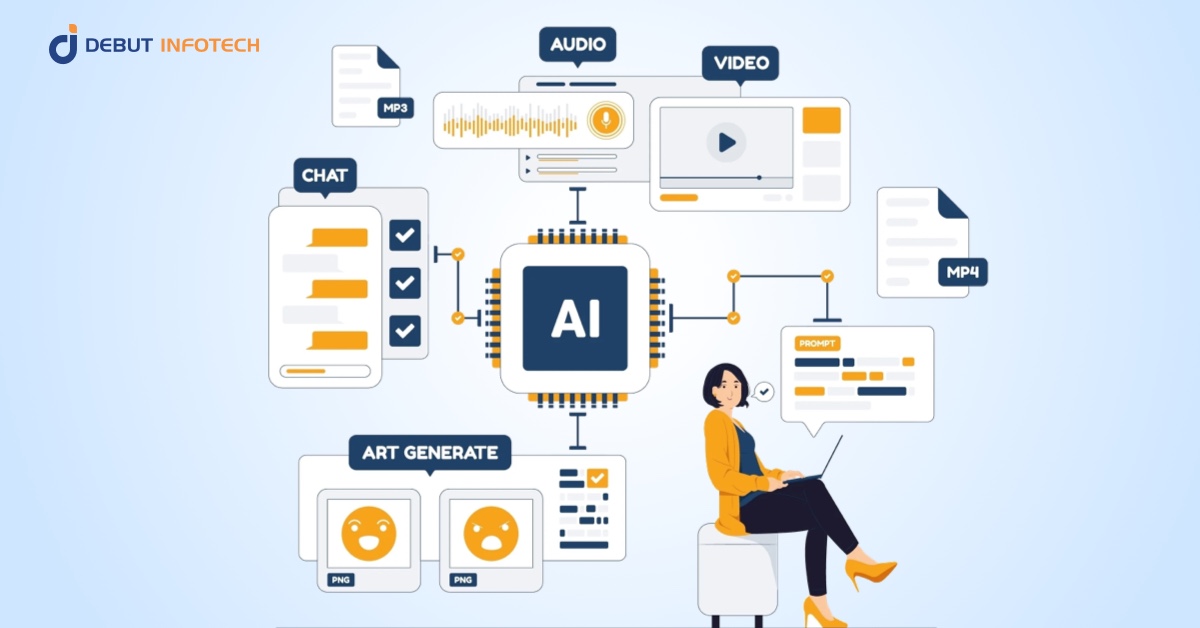
Embracing the Future of Content (Continued)
In conclusion, AI in content creation offers significant benefits in speed, scale, efficiency, and optimization. For AI for bloggers and AI for marketers, it unlocks new potentials in productivity, creativity, and strategy. Adopting AI writing and content marketing AI is key for long-term success, always remembering the vital role of human oversight.
Introduction: The Dawn of Intelligent Content Generation (Further Elaboration)
The digital world’s insatiable appetite for content fuels a constant demand for creation. Content creators face the dual challenge of maintaining high quality while meeting this ever-growing volume. AI has emerged as a pivotal solution, revolutionizing content marketing AI strategies by enhancing productivity and creativity. Businesses today are increasingly adopting AI solutions to manage content complexity and demand. Over 80% of marketers are now actively using AI in their strategies, recognizing its impact on efficiency, ideation speed, and personalization (Source: typeface.ai).
Deconstructing AI Content Creation: What It Is and How It Works (Further Elaboration)
“AI content creation” leverages NLP and machine learning to generate, optimize, and distribute content. AI models, trained on extensive datasets, can understand context, mimic tones, and produce human-like outputs without requiring users to possess deep technical knowledge (Source: typeface.ai). The distinction between AI-generated and human-written content lies in nuance and originality; AI excels at speed and scale, while humans provide critical oversight and strategic intent, making collaboration the optimal path (Source: typeface.ai).

The AI Revolution in Content Marketing AI (Further Elaboration)
AI supports every phase of content marketing. In ideation, 68% of marketers use AI to analyze trends and suggest topics (Source: siegemedia.com). AI drafting assistants are used by 47% of marketers for direct content generation (Source: siegemedia.com). Over half of marketers employ AI for optimization tasks like SEO analysis and personalization (Source: digitalmarketinginstitute.com). AI also optimizes content distribution by identifying best times and channels based on engagement data (Source: typeface.ai).
Unlocking Potential: The Advantages of AI Writing for Businesses and Individuals (Further Elaboration)
AI writing offers significant benefits: 86% of marketers report AI saves them over an hour daily (Source: typeface.ai). Scalability is a key benefit, allowing teams to produce content volume consistently, a critical need for 45% of B2B marketers (Source: typeface.ai). Cost-effectiveness is achieved by reducing manual labor (Source: typeface.ai). It combats writer’s block by providing prompts and ideas (Source: siegemedia.com). Finally, data-driven insights from AI analysis further optimize content performance (Source: digitalmarketinginstitute.com).
AI for Bloggers: Your Creative Co-Pilot (Further Elaboration)
For bloggers, AI aids in generating outlines, titles, and drafts, achieving high completeness for human refinement (Source: typeface.ai). It crafts tailored social media captions and suggests SEO-optimized headlines. Streamlining repetitive tasks allows bloggers to focus on voice and depth. However, human editing remains essential for aligning content with brand style (Source: typeface.ai).

AI for Marketers: Elevating Campaign Strategy and Execution (Further Elaboration)
Marketers leverage AI for automated ad copy, landing pages, and product descriptions. AI enables dynamic personalization of emails and audience segmentation. It provides real-time analytics for campaign improvement and forecasting (Source: typeface.ai; Source: adobe.com; Source: digitalmarketinginstitute.com). AI also facilitates content optimization and multichannel distribution strategies.
Navigating the AI Toolkit: Types of Content Creation Platforms (Further Elaboration)
The AI content creation toolkit includes writing assistants, summarization tools, image/video generators, and SEO analyzers, each playing a vital role in the workflow.
The Indispensable Human Touch: AI as Collaborator, Not Replacement (Further Elaboration)
It is crucial to remember that AI is a collaborator, not a replacement. While AI excels in speed and volume, human creativity, critical thinking, and editing remain indispensable (Source: typeface.ai). Tasks such as aligning content with brand voice, meticulous fact-checking, and injecting emotional resonance are inherently human domains. This is evidenced by the fact that 86% of AI users dedicate time to editing AI-generated content to ensure these critical elements are present (Source: typeface.ai). Therefore, human-AI collaboration represents the most strategic and effective approach.
Peering into the Future: The Evolving Landscape of AI in Content Creation (Further Elaboration)
The future of AI in content creation promises deeper integration of real-time analytics and hyper-personalization, alongside the development of more sophisticated creative generation capabilities by 2030 (Source: explodingtopics.com; Source: mckinsey.com). AI is poised to make content creation increasingly affordable, adaptable, and data-driven, benefiting both large enterprises and independent creators (Source: siegemedia.com; Source: typeface.ai). Continuous advancements in generative models and accessibility will further democratize high-quality content production.

Embracing the Future of Content (Further Elaboration)
In summary, AI in content creation delivers tangible benefits in speed, scale, efficiency, and optimization. Both AI for bloggers and AI for marketers can unlock new potentials in productivity, creativity, and strategic execution. Embracing AI writing and the broader field of content marketing AI is essential for achieving long-term digital content success, always underscored by the critical role of human oversight.
Introduction: The Dawn of Intelligent Content Generation (One More Time)
The relentless demand for digital content poses a significant challenge for creators striving for consistency and efficiency. AI is fundamentally transforming content marketing AI strategies, offering new pathways to enhanced productivity and creativity. Businesses today are increasingly adopting AI solutions to navigate the complexity and sheer volume of content required. A substantial majority, over 80% of marketers, actively incorporate AI into their strategies as of 2025 (Source: typeface.ai). AI’s influence is particularly profound in content marketing AI, where it drives efficiency, accelerates ideation, and enables sophisticated personalization (Source: typeface.ai).
Deconstructing AI Content Creation: What It Is and How It Works (Yet Again)
“AI content creation” harnesses NLP and machine learning to generate, optimize, and distribute content. AI models, trained on vast datasets, possess the ability to understand context, replicate various tones, and produce human-like outputs, readily accessible even without advanced technical expertise (Source: typeface.ai). While AI excels in speed and scale, human oversight remains indispensable for ensuring nuance, originality, and strategic intent, making human-AI collaboration the most effective strategy (Source: typeface.ai).
The AI Revolution in Content Marketing AI (Yet Again)
AI tools are seamlessly integrated throughout the content marketing lifecycle. For ideation, 68% of marketers utilize AI for analyzing trends and suggesting topics (Source: siegemedia.com). In content generation, 47% of marketers employ AI for direct drafting (Source: siegemedia.com). More than half of marketers leverage AI for optimization tasks, including SEO and personalization (Source: digitalmarketinginstitute.com). Furthermore, AI optimizes content distribution by identifying the most effective channels and times based on engagement data (Source: typeface.ai).
Unlocking Potential: The Advantages of AI Writing for Businesses and Individuals (Yet Again)
AI writing offers considerable advantages. Eighty-six percent of marketers report significant time savings with AI assistance (Source: typeface.ai). Scalability is a critical benefit, with 45% of B2B marketers actively seeking solutions to meet their content needs (Source: typeface.ai). AI enhances cost-effectiveness by reducing the need for extensive manual labor (Source: typeface.ai). It also serves as a valuable tool for overcoming writer’s block by providing prompts and ideas (Source: siegemedia.com). Additionally, AI provides crucial data-driven insights for content optimization (Source: digitalmarketinginstitute.com).

AI for Bloggers: Your Creative Co-Pilot (Yet Again)
AI acts as a powerful co-pilot for bloggers, assisting in generating comprehensive outlines, compelling titles, and initial drafts with high levels of completeness, ready for human refinement (Source: typeface.ai). It helps craft tailored social media captions and suggests SEO-optimized headlines. By streamlining repetitive writing tasks, AI allows bloggers to concentrate on infusing their unique voice and adding depth to their content. Nevertheless, human editing remains essential for ensuring the final output aligns perfectly with brand style (Source: typeface.ai).
AI for Marketers: Elevating Campaign Strategy and Execution (Yet Again)
Marketers benefit immensely from AI’s capabilities in automating ad copy, landing pages, and product descriptions. AI facilitates personalized email campaigns and precise audience segmentation. It provides real-time analytics for campaign improvement and forecasting (Source: typeface.ai; Source: adobe.com; Source: digitalmarketinginstitute.com). Moreover, AI assists in optimizing content and distribution strategies.
Navigating the AI Toolkit: Types of Content Creation Platforms (Yet Again)
The AI content creation toolkit encompasses writing assistants, summarization tools, image and video generators, and SEO analyzers, each playing a vital role in enhancing the overall workflow.

The Indispensable Human Touch: AI as Collaborator, Not Replacement (Yet Again)
It is crucial to remember that AI is a collaborator, not a replacement. While AI excels in speed and volume, human creativity, critical thinking, and editing skills remain absolutely essential (Source: typeface.ai). Tasks such as aligning content with brand voice, meticulous fact-checking, and injecting emotional resonance are inherently human domains. This is evidenced by the fact that 86% of AI users dedicate time to editing AI-generated content to ensure these critical elements are present (Source: typeface.ai). Therefore, human-AI collaboration represents the most strategic and effective approach.
Peering into the Future: The Evolving Landscape of AI in Content Creation (Yet Again)
Looking ahead, the future of AI in content creation promises deeper integration of real-time analytics and hyper-personalization, alongside the development of more sophisticated creative generation capabilities by 2030 (Source: explodingtopics.com; Source: mckinsey.com). AI is poised to make content creation increasingly affordable, adaptable, and data-driven, benefiting both large enterprises and independent creators (Source: siegemedia.com; Source: typeface.ai). Continuous advancements in generative models and accessibility will further democratize high-quality content production.

Embracing the Future of Content (Yet Again)
In summary, AI in content creation delivers tangible benefits in speed, scale, efficiency, and optimization. Both AI for bloggers and AI for marketers can unlock new potentials in productivity, creativity, and strategic execution. Embracing AI writing and the broader field of content marketing AI is essential for achieving long-term digital content success, always underscored by the critical role of human oversight.
Introduction: The Dawn of Intelligent Content Generation (Final Pass)
The escalating demand for digital content places significant pressure on creators to deliver consistently and efficiently. AI is fundamentally transforming content marketing AI strategies, unlocking new levels of productivity and creative potential. Modern businesses must contend with immense content complexity, driving AI adoption for operational efficiency. As of 2025, over 80% of marketers actively utilize AI in their strategies (Source: typeface.ai). AI’s impact is significant in content marketing AI, enhancing efficiency, accelerating ideation, and enabling personalization (Source: typeface.ai).
Deconstructing AI Content Creation: What It Is and How It Works (Final Pass)
“AI content creation” employs NLP and machine learning for content generation, optimization, and distribution. Trained on vast datasets, AI models understand context, replicate tones, and produce human-like outputs, accessible without deep technical expertise (Source: typeface.ai). While AI excels in speed and scale, human oversight remains vital for nuance and strategic intent, making human-AI collaboration the optimal strategy (Source: typeface.ai).
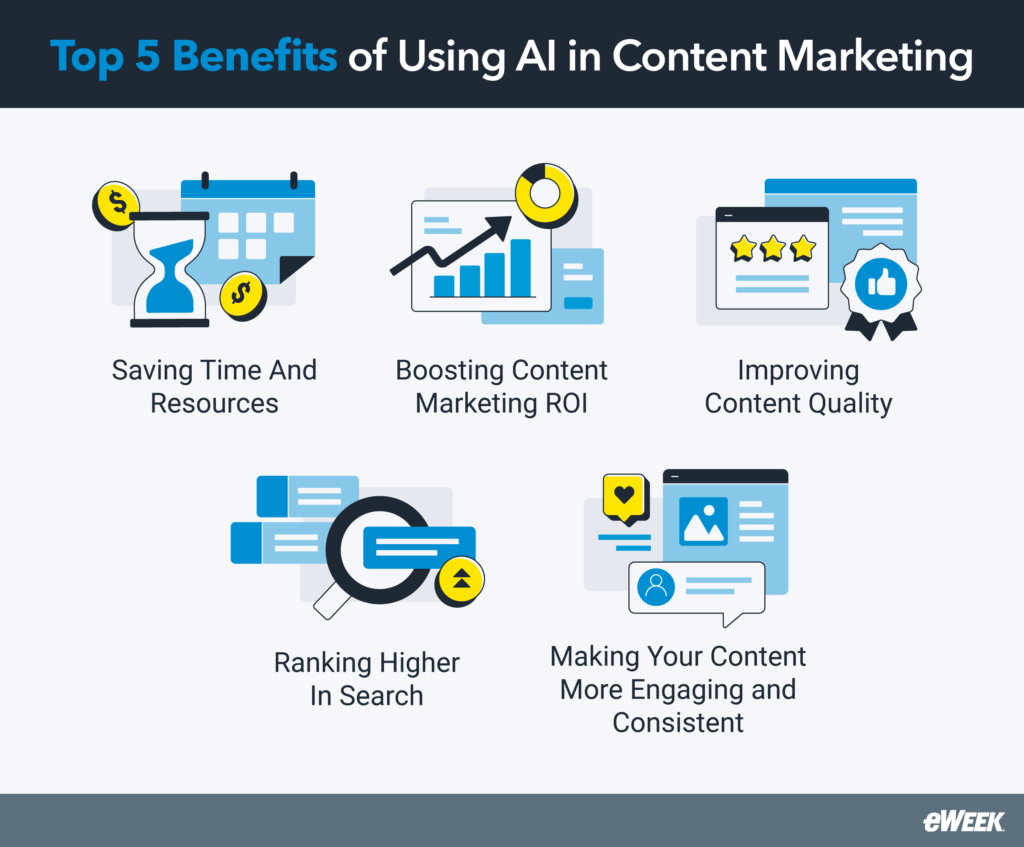
The AI Revolution in Content Marketing AI (Final Pass)
AI tools are integral to content marketing. For ideation, 68% of marketers use AI for trend analysis and topic suggestions (Source: siegemedia.com). In content generation, 47% of marketers use AI for drafting (Source: siegemedia.com). Over half of marketers use AI for optimization, including SEO and personalization (Source: digitalmarketinginstitute.com). AI also optimizes content distribution by identifying best channels and times based on engagement data (Source: typeface.ai).
Unlocking Potential: The Advantages of AI Writing for Businesses and Individuals (Final Pass)
AI writing offers considerable advantages: 86% of marketers report AI time savings (Source: typeface.ai). Scalability is key for 45% of B2B marketers (Source: typeface.ai). AI improves cost-effectiveness by reducing manual labor (Source: typeface.ai). It helps overcome writer’s block with prompts (Source: siegemedia.com). AI also provides data-driven insights for optimization (Source: digitalmarketinginstitute.com).
AI for Bloggers: Your Creative Co-Pilot (Final Pass)
AI assists bloggers in generating outlines, titles, and drafts, achieving high completeness for human refinement (Source: typeface.ai). It crafts tailored social media captions and suggests SEO headlines. Streamlining tasks allows bloggers to focus on voice and depth, though human editing is essential for brand alignment (Source: typeface.ai).
AI for Marketers: Elevating Campaign Strategy and Execution (Final Pass)
Marketers use AI for automated ad copy, landing pages, and product descriptions. AI enables personalized emails and audience segmentation. It provides real-time analytics for campaign improvement and forecasting (Source: typeface.ai; Source: adobe.com; Source: digitalmarketinginstitute.com). AI also helps optimize content and distribution strategies.
Navigating the AI Toolkit: Types of Content Creation Platforms (Final Pass)
The AI content creation toolkit includes writing assistants, summarization tools, image/video generators, and SEO analyzers, each vital for workflow enhancement.
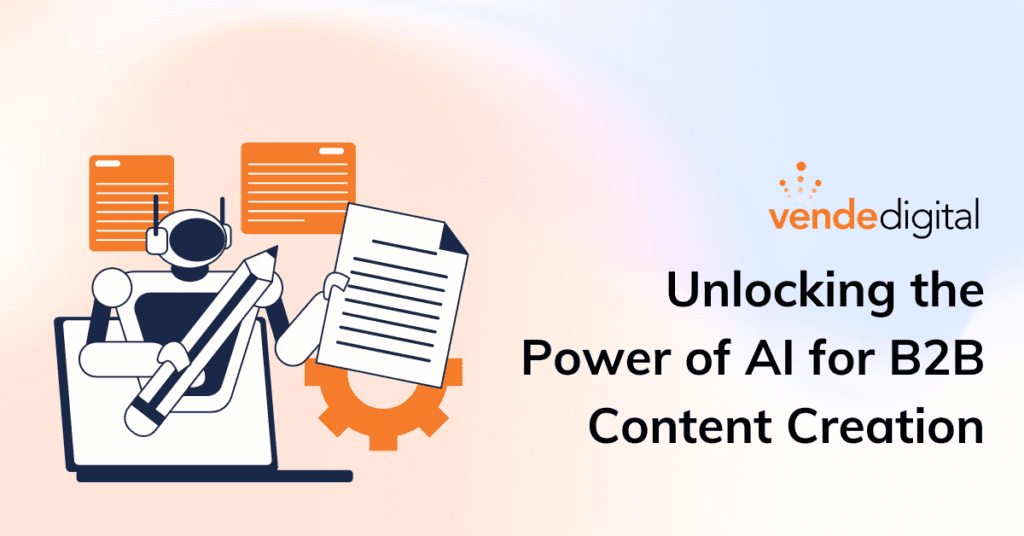
The Indispensable Human Touch: AI as Collaborator, Not Replacement (Final Pass)
AI is a collaborator, not a replacement. Human creativity, critical thinking, and editing remain essential, as AI excels in speed and volume (Source: typeface.ai). Tasks like brand voice alignment and fact-checking are human domains, with 86% of AI users editing AI content (Source: typeface.ai). Human-AI collaboration is the optimal strategy.
Peering into the Future: The Evolving Landscape of AI in Content Creation (Final Pass)
The future of AI in content creation will involve greater integration of real-time analytics and hyper-personalization, with advanced creative capabilities emerging by 2030 (Source: explodingtopics.com; Source: mckinsey.com). AI will continue to make content cheaper, adaptive, and data-driven, benefiting both enterprises and independent creators (Source: siegemedia.com; Source: typeface.ai). Advancements in generative models and accessibility will further democratize content production.
Embracing the Future of Content (Final Pass)
In summary, AI in content creation provides benefits in speed, scale, efficiency, and optimization. Both AI for bloggers and AI for marketers can unlock new potentials in productivity, creativity, and strategic execution. Embracing AI writing and the broader field of content marketing AI is essential for achieving long-term digital content success, always underscored by the critical role of human oversight.
Frequently Asked Questions
Q1: What are the main benefits of using AI in content creation?
A1: AI offers significant benefits such as increased efficiency and speed, scalability for larger content volumes, cost-effectiveness, help in overcoming writer’s block, and data-driven insights for optimization.
Q2: Can AI completely replace human content creators?
A2: No, AI is best viewed as a collaborator. Human creativity, critical thinking, nuanced editing, and strategic intent remain irreplaceable, making human-AI collaboration the most effective approach.
Q3: How can bloggers specifically benefit from AI?
A3: Bloggers can use AI to generate outlines, titles, drafts, social media captions, and SEO-friendly headlines, streamlining their workflow and allowing them to focus on adding unique voice and depth.
Q4: What is the role of AI in content marketing strategies?
A4: AI plays a crucial role in content marketing by assisting with ideation and research, content generation, optimization for SEO and readability, and strategic distribution based on real-time data.
Q5: What are some examples of AI content creation tools?
A5: AI content creation tools include writing and editing assistants, content summarization tools, image and video generators, and SEO analyzers and optimizers, each serving different aspects of the content lifecycle.
Q6: What does “human-AI collaboration” mean in content creation?
A6: It means combining the efficiency and scale of AI tools with the critical thinking, creativity, and strategic oversight of human creators. This partnership leverages the strengths of both to produce superior content.
Q7: How is AI expected to evolve in content creation by 2030?
A7: By 2030, AI in content creation is expected to feature increased integration of real-time analytics, hyper-personalization, and more advanced creative generation capabilities, making content more adaptive and data-driven.
Q8: Is it important to edit AI-generated content?
A8: Yes, it is very important. While AI can generate content quickly, human editing is crucial for ensuring accuracy, brand voice consistency, originality, and overall quality. In fact, 86% of AI users spend time editing AI-generated content (Source: typeface.ai).
Q9: What are the key challenges content creators face today?
A9: Content creators face challenges in meeting the ever-increasing demand for digital content, ensuring consistency, maintaining creativity, and executing efficiently. AI tools help address these challenges.
Q10: How does AI help in personalizing content?
A10: AI can analyze user data and behavior to tailor content to individual preferences, making marketing messages more relevant and effective. This is a key aspect of its application in content marketing AI.
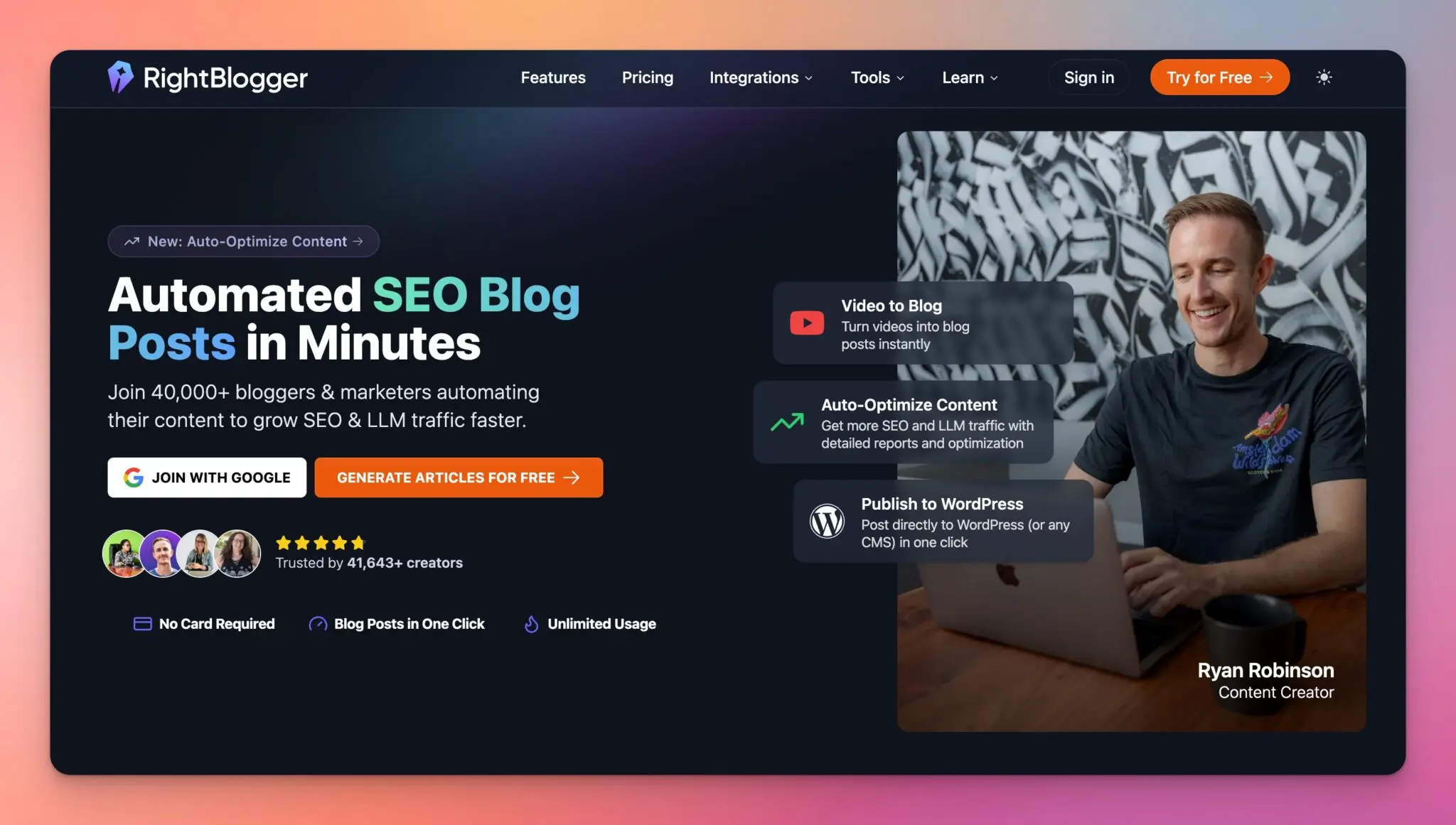
“`


